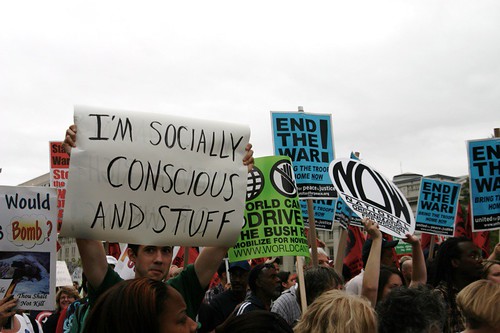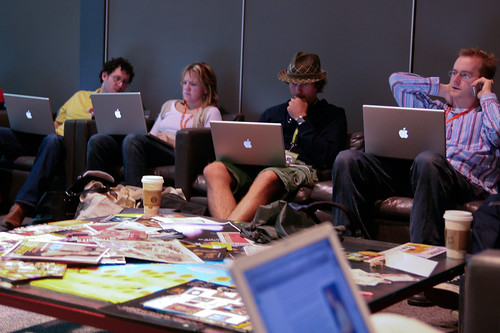Yesterday, I attended the Web Managers Roundtable at the Grosvener Auditorium at National Geographic. The Roundtable is a monthly get together of web managers from around Washington, sponsored by Aquent, Omniture and other companies. The subject of the talk was “Marketing Optimization: The Holy Grail of Continuous Improvement.”
Betsy Scolnik, President of National Geographic Digital Media, provided the introduction to the main speaker, Jim Sterne. Nationalgeographic.com had 73 million visitors last year. They overhauled all their sites in the last two years, investing in major hardware and software upgrades.
Jim Sterne then presented on “Marketing Optimization: The Holy Grail of Continuous Improvement.” Sterne has written six books on Internet advertising, marketing and customer service. He is also is the producer of the annual Emetrics Summit (in DC, Oct 14-17) and is the founder of the Web Analytics Association. He’s been involved in web marketing since the beginning – I saw him speak way back in 1998.
He defined marketing optimization as measured, incremental improvement. You examine the data, see what’s working, and adjust your site accordingly. “If you treasure it, measure it,” in his words. With web analytics, you can test strategy and messaging on your site.
He believes that we’re just at the beginning of the web analytics evolution. Web sites are swimming in data on visits, page views, click-throughs, etc… And now, with services like Omniture, Web Trends and Google Analytics, that data is easier than ever to access and present. But the question is, what questions do we want answered? Which numbers matter and what actions do we take based upon them?
The good thing is that this data eliminates decisions made in a smoke-filled room or by the whim of a CEO (“I want a red button.”) Everything can be measured now. With A/B testing, you can try two different versions of the same web page and see which performs better. With multivariate testing, you can try multiple elements on the same web page in several different versions and examine the results. Companies are also adjusting their offers based upon user behavior – think how Amazon changes their home page based upon what you buy or look at.
Smart companies are using this information to gain insight into consumer behavior. There’s a marked difference between what people say they do (“I exercise regularly.”) versus what they actually do (“I never miss a happy hour.”)
Why does this matter? Because the Internet is where people learn about your organization, it’s where you’re defined. Consumers don’t know the different parts of your organization. They expect messaging to be coordinated across all media – web, print, call center, etc… And they want you to speak to them in their language.
Brendan Hart and Ted McDonald from nationalgeographic.com then discussed their marketing analytics efforts. Sterne was theory; they were reality. In their view, marketing optimization is an art and a science, since consumer behavior is constantly changing. They’ve focused on a set of Key Performance Indicators. Out of the wealth of data available, they suggest following the numbers that are most relevant to you – visitors, page views, time spent on site, newsletter signups, orders, etc… To do so, they use Omniture with an Excel plugin to produce weekly traffic reports. These reports are distributed across the organization and people are trained in how to understand the data. Content is adjusted accordingly. For example, they expanded a section on the “Seven Wonders of the World” that proved to be popular.
Overall, the philosophy they’ve followed is Strategize, Optimize, Monetize. For example, they tried out a “subscribe” button on their home page and then changed the color and made it bold, because it performed better this way, and led to more subscriptions.
What was interesting was the divergence between theory and practice. Sterne is right – web analytics are a powerful tool. However, these tools still require humans to examine the data and take action based upon their interpretations of that information.





